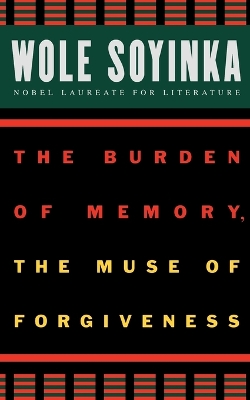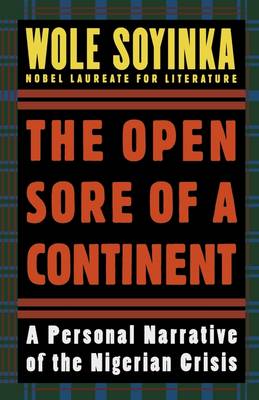The W.E.B. Du Bois Institute
2 total works
When Nobel laureate Wole Soyinka's The Open Sore of a Continent appeared in 1996, it received rave reviews in the national media. Now comes Soyinka's powerful sequel to that fearless and passionate book, The Burden of Memory.
Where Open Sore offered a critique of African nationhood and a searing indictment of the Nigerian military and its repression of human and civil rights, The Burden of Memory considers all of Africa-indeed, all the world-as it poses the next logical question: Once repression stops, is reconciliation between oppressor and victim possible? In the face of centuries long devastations wrought on the African continent and her Diaspora by slavery, colonialism, Apartheid
and the manifold faces of racism what form of recompense could possibly be adequate? In a voice as eloquent and humane as it is forceful, Soyinka examines this fundamental question as he illuminates the principle duty and "near intolerable burden" of memory to bear the record of injustice. In so doing, he challenges
notions of simple forgiveness, of confession and absolution, as strategies for social healing. Ultimately, he turns to art-poetry, music, painting-as one source that may nourish the seed of reconciliation, art as the generous vessel that can hold together the burden of memory and the hope of forgiveness.
Based on Soyinka's Stewart-McMillan lectures delivered at the Du Bois Institute at Harvard, The Burden of Memory speaks not only to those concerned specifically with African politics, but also to anyone seeking the path to social justice through some of history's most inhospitable terrain.
Where Open Sore offered a critique of African nationhood and a searing indictment of the Nigerian military and its repression of human and civil rights, The Burden of Memory considers all of Africa-indeed, all the world-as it poses the next logical question: Once repression stops, is reconciliation between oppressor and victim possible? In the face of centuries long devastations wrought on the African continent and her Diaspora by slavery, colonialism, Apartheid
and the manifold faces of racism what form of recompense could possibly be adequate? In a voice as eloquent and humane as it is forceful, Soyinka examines this fundamental question as he illuminates the principle duty and "near intolerable burden" of memory to bear the record of injustice. In so doing, he challenges
notions of simple forgiveness, of confession and absolution, as strategies for social healing. Ultimately, he turns to art-poetry, music, painting-as one source that may nourish the seed of reconciliation, art as the generous vessel that can hold together the burden of memory and the hope of forgiveness.
Based on Soyinka's Stewart-McMillan lectures delivered at the Du Bois Institute at Harvard, The Burden of Memory speaks not only to those concerned specifically with African politics, but also to anyone seeking the path to social justice through some of history's most inhospitable terrain.
On November 10, 1995, the Nigerian military government under General Sani Abacha executed dissident writer Ken Saro-Wiwa along with eight other activists, and the international community reacted with outrage. The response was quick, decisive, and nearly unanimous: Nigeria is an outcast in the global village. The events that led up to Saro-Wiwa's execution mark Nigeria's decline from a post-colonial success story to its current military dictatorship, and few writers
have been more outspoken in decrying and lamenting this decline than Nobel Prize laureate and Nigerian exile Wole Soyinka.
In The Open Sore of a Continent, Soyinka, whose own Nigerian passport was confiscated 1994, explores the history and future of Nigeria in a compelling jeremiad that is as intense as it is provocative, learned, and wide-ranging. He deftly explains the shifting dramatis personae of Nigerian history and politics , arguing that `a glance at the mildewed tapestry of the stubbornly unfinished nation edifice' is necessary to explain where Nigeria can go next.
In the process of elucidating the Nigerian crisis, Soyinka opens readers to the broader questions of nationhood, identity, and the general state of African culture and politics at the end of the twentieth century. He examines the different ways in which a nation can be defined, and asks how these varying definitions impact the people who live under them? Soyinka concludes with a resounding call for international attention to this question: the global community must address the issue of
nationhood to prevent further religious mandates and calls for ethnic purity of the sort that have turned Algeria, Rwanda, Bosnia, and Sri Lanka into killing fields.
have been more outspoken in decrying and lamenting this decline than Nobel Prize laureate and Nigerian exile Wole Soyinka.
In The Open Sore of a Continent, Soyinka, whose own Nigerian passport was confiscated 1994, explores the history and future of Nigeria in a compelling jeremiad that is as intense as it is provocative, learned, and wide-ranging. He deftly explains the shifting dramatis personae of Nigerian history and politics , arguing that `a glance at the mildewed tapestry of the stubbornly unfinished nation edifice' is necessary to explain where Nigeria can go next.
In the process of elucidating the Nigerian crisis, Soyinka opens readers to the broader questions of nationhood, identity, and the general state of African culture and politics at the end of the twentieth century. He examines the different ways in which a nation can be defined, and asks how these varying definitions impact the people who live under them? Soyinka concludes with a resounding call for international attention to this question: the global community must address the issue of
nationhood to prevent further religious mandates and calls for ethnic purity of the sort that have turned Algeria, Rwanda, Bosnia, and Sri Lanka into killing fields.

